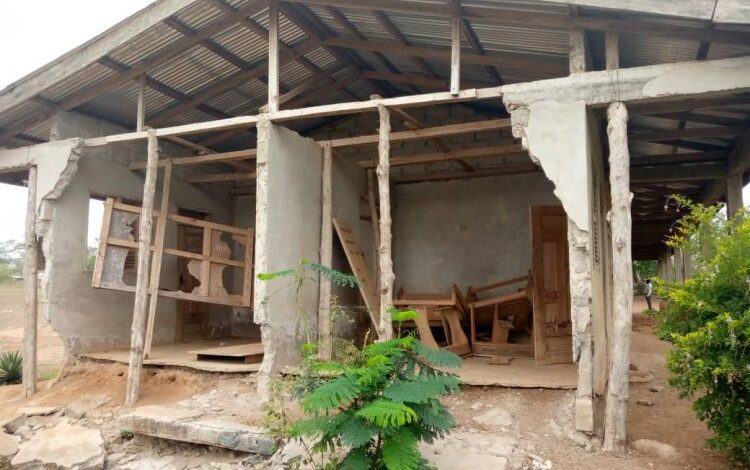Goka Presby Primary KG block turns death trap, Assembly Member calls for intervention
- Advertisement -
A Goka Presby School KG block in the Jaman North District of the Bono Region is under serious threat as academic work is conducted in an old dilapidated building.
The Goka dilapidated Presby School building that was, built years ago is exposing the lives of pupils and teachers to danger since it is feared to collapse any time soon.
- Advertisement -
A visit to the school by Soiree News saw the pupils learning under poor classroom blocks in an unfavorable condition.
- Advertisement -
We observed the block had cracks on the floor and windows were in their deplorable state.
Mr. Kwang expressed worry about the situation stressing that the structure is virtually collapsing and has become a death trap.
He is appealing to the Dormaa Central Municipal Assembly and philanthropists to come to their aid to construct a modernized school block to enhance Teaching and learning in the area.
Freely accessible and basic compulsory education is not just an ordinary right that can be conferred on a child’s will, rather a legal right that is adequately provided for by the laws of the country with specific reference to Article 25 (a) of the 1992 Constitution, and also the Education Act (2008) and Free Compulsory Universal Basic Education (FCUBE) programme.
Available data shows that the nation has made gains in the gross enrolment rates at the basic education level especially at kindergarten and primary level following the implementation of social intervention programmes such as capitation grant, school feeding, free textbooks, and free exercise books.
- Advertisement -
However, one daunting challenge that confronts Ghana’s education system is the lack of adequately suitable classrooms for all children to sit and learn.
The challenge has led many school managers to improvise with trees under which children sit to receive teaching and learning.
This improvisation is referred to as “schools under trees”, and it is prevalent in some parts of the country.

In 2010, however, the first bold and comprehensive policy to address the problem was launched by the then President, Professor John Evans Atta Mills.
The initiative was to remove all 2,936 identified schools under trees in the country by constructing proper school blocks to replace those under trees.
As of the close of 2017, sources from the Ministry of Education indicate that 2,031 of such schools had been eliminated.
Years down the line, “schools under trees” can still be found in various parts of the country. For example, the Presbyterian Experimental Primary School at Bimbilla in the Nanumba North Municipality in the Northern Region has resorted to holding classes under makeshift structures and trees while the pupils use stones and benches for lessons.
Source: SN24News
- Advertisement -

